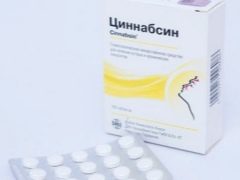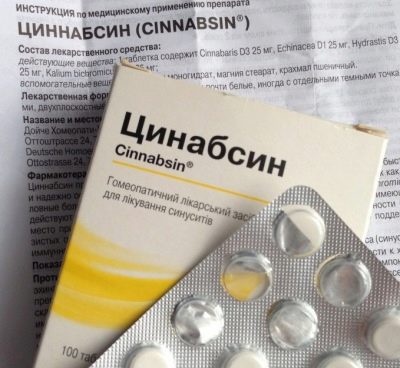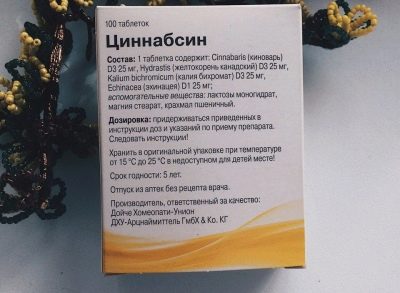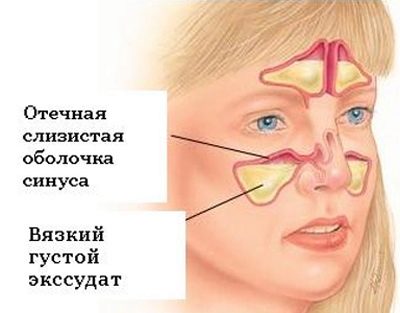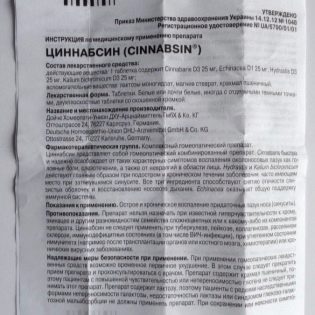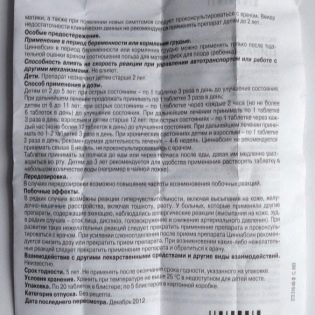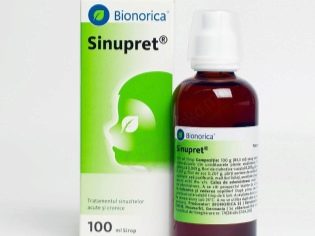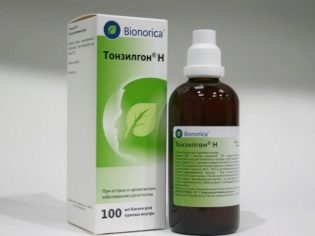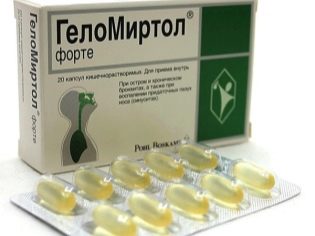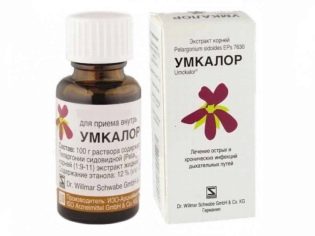Cinnabsin for children: instructions for use
Inflammation of the nasopharynx and paranasal sinuses is a common problem in childhood, because babies are less resistant to attacks of pathogenic bacteria and viruses. In the treatment of such inflammatory processes, along with traditional medicines, homeopathy is also often used.
One of the remedies that are considered effective for sinusitis is Zinnabsin.
Special features
The drug is made in Germany only in one form - in the form of tablets that need to be absorbed in the mouth. They have a grayish or white color (yellow or orange is also normal), a round shape and a sweet taste. Such tablets are distributed in blisters of 20 pieces, and one pack of Zinnabsin contains 100 tablets.
Composition
The effect of funds on the ENT organs is due to a combination of four components, which include:
- substances derived from echinacea;
- a sulfur and mercury compound called cinnabaris;
- substances from yellow root, which is also called hydrostis;
- a compound of potassium and chromium, which is called potassium bichromate.
The homeopathic dilution of the echinacea-derived component is D1, the other components of the tablets are D3. The dosage of each of the ingredients in one tablet is 25 mg. Auxiliary compounds in Zinnabsin are milk sugar and wheat starch, as well as magnesium stearate.
Operating principle
According to information from the manufacturer, the substances present in the "Zinnabsin" possess such properties:
- reduce the swelling of the mucous membrane;
- have anti-inflammatory effects;
- prevent excessive secretion in the paranasal sinuses;
- facilitate breathing through the nasal passages;
- strengthen the local immunity in the nasopharynx.
Indications
The most common reason for using Zinnabsin is sinusitis. The tool is in demand for sinusitis, frontalis and inflammation in the other sinuses. It can be used in the midst of an acute illness, and during exacerbation of a chronically occurring inflammatory process.
It is also prescribed to patients with adenoids and a protracted run of cold.
Contraindications
"Cinnabsin" is not used in children with hypersensitivity to the components of such an agent. Due to the presence of wheat starch in tablets, they cannot be given for celiac disease, and the presence of lactose in the composition adds to the list of contraindications milk intolerance and a deficiency of lactase.
The annotation to "Zinnabsin" states that tablets should not be taken to babies under 3 years old, since their effect on such young patients has not been studied.
Side effects
During the use of "Zinnabsin" is not excluded an allergic reaction to tablets, which can manifest pathological changes in the skin (itching, rash, redness). In this situation, the drug should be stopped immediately.
Also, some patients may have a lot of saliva when resorbing a pill. In order to eliminate such a side effect, the dosage is reduced or rejected by treatment with “Zinnabsin”, choosing instead an analogue for which there is no negative reaction.
In addition, as with the use of other homeopathy, a worsening of the condition may be observed at the beginning of the administration of “Cinnabsin”. It also requires the abolition of pills and treatment to the doctor.
Instructions for use
The drug should be given to children half an hour before meals, and if the patient has just eaten, then you should wait 30 minutes before taking the pill.“Cinnabsin” should slowly dissolve in the oral cavity, and if it is difficult for the child to do this or the parents cannot control whether the baby has swallowed a pill (usually such difficulties occur in patients 3-5 years old), it is allowed to grind the product into a powder, then pour it child under the tongue. You can also dissolve the crushed tablet in a small amount of water and give the prepared patient to drink the prepared solution.
The pattern of use of Zinnabsin depends on the course of the disease for which the drug is prescribed. If the disease is acute, then the remedy is given to the child one tablet at intervals of 2 hours. The maximum number of tablets per day depends on age - children 3-6 years old are allowed to take 6 tablets of Zinnabsin during the day, patients of 6-12 years old are given up to 8 tablets, and adolescents over 12 years old can dissolve up to 12 tablets.
As soon as the patient’s condition begins to improve, the Zinnabsin treatment regimen changes:
- for a child of 3-6 years old, a remedy is given three times a day, 1/2 tablet;
- patient 6-12 years old - twice a day for the whole tablet;
- a child over 12 years old - three times a day, 1-2 tablets.
In the indicated dosages, the agent is continued to be used until complete recovery occurs. If on 2-3 days of pill use no improvement is visible, a second consultation with a doctor is needed so that he can prescribe another treatment.
If "Zinnabsin" is discharged with chronic pathology, then it is used as follows:
- 1/2 tablet three times a day if the child is between three and six years old;
- on the whole tablet twice, if the patient is 6-12 years old;
- on the whole tablet three times (sometimes the dosage is increased to 2 tablets per reception), if the drug is given to a patient over 12 years old.
The duration of use of "Zinnabsin" in chronic disease should be clarified with a doctor. Reception is stopped as soon as the patient's condition improves. Sometimes a means prescribed a long course of up to 2 months.
Terms of sale and storage
Since “Zinnabsin” refers to over-the-counter drugs, there are no difficulties with purchasing it at the pharmacy. The average price of 100 tablets is 600 rubles.
At home, they should be stored at a temperature of + 10 + 25 degrees in a dry place. Shelf life of the drug - 4 years.
Reviews
On the use of "Zinnabsin" in various forms of sinusitis in children there are many positive reviews. They call the tool effective and harmless, as well as convenient to use. His main disadvantage is considered expensive, and in the negative reviews complain about the lack of therapeutic effect.
Analogs
If you need to replace "Zinnabsin" with a similar medicine, the doctor will recommend one of the following drugs.
- Sinupret. Such a remedy based on several plant extracts (from gentian, verbena, elder and other plants) is often used to treat sinusitis, adenoiditis, pharyngitis or rhinitis. In drops, it is prescribed to children over 2 years old, and in pills - to six-year-old patients and older.
- «Tonsilgon N». This medicine in drops, containing extracts of horsetail, dandelion, althea and other medicinal plants is used for adenoiditis, SARS, laryngitis and other diseases in children older than a year. In the form of pills, it can be given from 6 years.
- «GeloMirtol». Such capsules are prescribed for adenoids, bronchitis, sinusitis and laryngitis. They act on the upper respiratory tract due to herbal ingredients called limonene, cyneol and alpha pinene. The drug can be used from 6 years of age.
- «Umkalor». Thanks to the extract of pelargonium, this solution is effective in various respiratory diseases. He is given to drink to children from 1 year.
The opinion of Dr. Komarovsky about homeopathic medicines you will learn from the following video.
